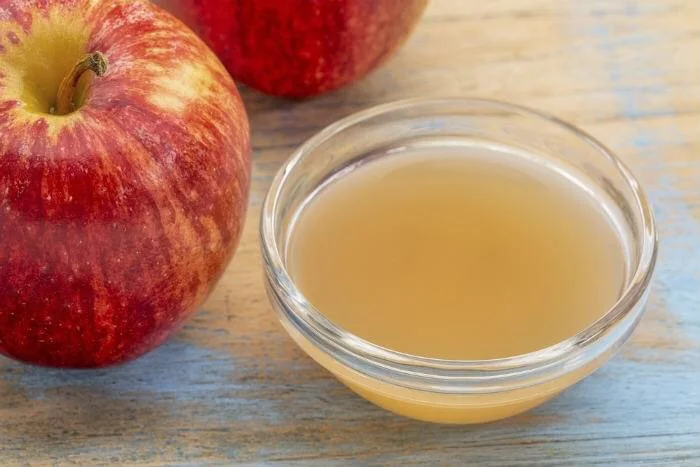Table of Contents
Kombucha and Apple Cider Vinegar (ACV) are the rockstars of the health world, celebrated for their gut-friendly probiotics and potential health benefits. But when it comes to choosing the best one for you, it’s easy to get lost in the hype. This head-to-head comparison breaks down their pros, cons, and what to consider so you can make the right choice for your health goals.
Hey there, health enthusiasts! Ever found yourself standing in the grocery store, torn between grabbing a bottle of fizzy Kombucha Tea or. Apple Cider Vinegar? You’re not alone. These two fermented superstars have been making waves in the health and wellness world, but what’s the real scoop on their benefits and differences? Let’s dive in and unravel the mystery of kombucha and apple cider vinegar (ACV) together!
The Fermentation Nation: What Are Kombucha and ACV?
Before we pit these two against each other, let’s get to know our contenders a bit better.
Kombucha: The Fizzy Favorite

Kombucha is like the cool kid of the fermented food world. It’s a fermented tea that’s been around for thousands of years, originating in Northeast China. Here’s the lowdown:
- Made by fermenting sweet tea with a symbiotic culture of bacteria and yeast (SCOBY)
- Results in a fizzy, slightly sweet, and tangy beverage
- Typically contains a small amount of alcohol (usually less than 0.5%)
- Available in various flavors, from fruity to herbal
According to a study published in the Journal of Food Science, kombucha is rich in organic acids, vitamins, and polyphenols, which contribute to its potential health benefits.
Apple Cider Vinegar: The Tangy Titan

Apple cider vinegar might not be as flashy as kombucha, but it’s got a loyal following for good reason. Here’s what you need to know:
- Made by fermenting apple juice with yeast and bacteria
- Has a strong, acidic taste
- Often used in cooking, but also consumed as a health tonic
- Available in raw, unfiltered form (with “the mother”) or filtered
Research published in the Journal of Food Science indicates that ACV contains acetic acid, which is responsible for many of its potential health benefits.
The Health Showdown: Benefits of Kombucha vs. ACV
Now that we’ve got the basics down, let’s compare these fermented favorites in terms of their health benefits.
Kombucha’s Health Highlights
- Probiotics Galore: Kombucha is teeming with beneficial bacteria that can support gut health. A healthy gut microbiome has been linked to improved digestion, stronger immunity, and even better mental health.
- Antioxidant Powerhouse: The tea base of kombucha provides polyphenols, which are powerful antioxidants. These can help protect your cells from damage caused by free radicals.
- Potential Cancer Fighter: Some studies, like this one from the Journal of Nutritional Biochemistry, suggest that kombucha may have cancer-fighting properties, though more research is needed.
- Heart Health Helper: Regular kombucha consumption might help improve cholesterol levels, potentially reducing the risk of heart disease.
ACV’s Awesome Attributes
- Blood Sugar Regulation: ACV may help improve insulin sensitivity and lower blood sugar responses after meals, making it potentially beneficial for people with diabetes.
- Weight Management Ally: Some studies suggest that ACV can increase feelings of fullness, potentially aiding in weight loss efforts.
- Digestive Aid: The acetic acid in ACV may help with digestion by increasing stomach acid production.
- Antimicrobial Properties: ACV has been shown to have antimicrobial effects, which could help fight off harmful bacteria.
While both kombucha and ACV offer impressive health benefits, it’s important to note that more research is needed to fully understand their effects. Always consult with a healthcare professional before using these as part of a treatment plan.
Taste Test: Kombucha vs. ACV
Let’s be real – health benefits are great, but taste matters too! Here’s how these two stack up in the flavor department:
Kombucha’s Flavor Profile
- Slightly sweet and tart
- Fizzy, like a healthier version of soda
- Available in a wide range of flavors (fruit, herbs, spices)
- Some describe it as an acquired taste, but many find it refreshing
ACV’s Taste
- Strong, acidic flavor
- Very tart and vinegary
- Often diluted with water or mixed into other drinks
- Can be an acquired taste for many
When it comes to taste, kombucha generally wins out for most people due to its variety of flavors and more palatable fizzy nature. However, some folks swear by the strong, tangy kick of ACV.
How to Use Kombucha and ACV in Your Daily Routine
Wondering how to incorporate these fermented favorites into your life? Here are some ideas:
Kombucha Ideas
- Enjoy as a refreshing drink on its own
- Use as a base for mocktails
- Add to smoothies for a probiotic boost
- Use as a marinade for meats (the acidity tenderizes!)
ACV Applications
- Mix 1-2 tablespoons with water and drink before meals
- Use in salad dressings and marinades
- Add a splash to soups or stews for extra flavor
- Use as a natural household cleaner (diluted)
The Bottom Line: Which One Should You Choose?
After this deep dive into the world of kombucha and ACV, you might be wondering which one comes out on top. The truth is, there’s no clear winner – it really depends on your personal health goals, taste preferences, and how you plan to use it.
If you’re looking for a tasty, probiotic-rich beverage that’s easy to incorporate into your daily routine, kombucha might be your new best friend. On the other hand, if you’re after a versatile, low-calorie option with potential benefits for blood sugar control and weight management, ACV could be your go-to.
Remember, both kombucha and ACV are generally safe for most people when consumed in moderation. However, it’s always a good idea to chat with your healthcare provider before making significant changes to your diet, especially if you have any underlying health conditions.
So, whether you’re Team Kombucha or Team ACV, you’re making a great choice for your health. Why not try both and see which one makes you feel like a wellness warrior? Your taste buds (and your gut) will thank you!
Summary
Apple Cider Vinegar
- Acetic Acid – The main acid in apple cider vinegar. Acetic Acid Bacteria Ferment and eat glucose and ethanol (Alcohol). The benefit of this acid is mainly for the blood sugars, helps with insulin resistance, helps insulin become more sensitive, is good for digestion, and good for fatty liver because it strips of fat, and has 0 sugar.
Take it with meals one teaspoon with lemon juice
Kombucha Tea
- Lactic Acid and Gluconic Acid – These acids are good for lowering the digestive tracts.
- Probiotics – It helps build up the friendly bacteria in the gut.
- It has 2-6 grams of sugar
- It is good for improving digestion
- Good for the intestines
- It has a lot of antioxidants
- Recommended for people as a substitute for alcohol.
DATA
https://www.ncbi.nlm.nih.gov/pmc/articles/PMC4438142
https://pubmed.ncbi.nlm.nih.gov/25626409
FAQ
Is kombucha as good as apple cider vinegar?
Kombucha and apple cider vinegar (ACV) both offer unique health benefits, but they serve different purposes. Kombucha is a fermented tea rich in probiotics, which can enhance gut health and digestion. It is often enjoyed for its refreshing taste and effervescence. ACV, on the other hand, is known for its potential to regulate blood sugar levels, aid in weight loss, and improve insulin sensitivity. While both beverages can be beneficial, the choice between them depends on individual health goals and taste preferences.
Which is more effective: apple cider vinegar or green tea?
When comparing apple cider vinegar and green tea, research suggests that green tea may be more effective for weight loss. Green tea contains catechins, particularly epigallocatechin gallate (EGCG), which can boost metabolism and promote fat burning. In contrast, while ACV has been shown to aid in weight management and blood sugar control, its weight loss effects are generally less pronounced. Both can be beneficial when incorporated into a healthy lifestyle, but green tea may offer more significant weight loss benefits.
What is stronger than apple cider vinegar?
In terms of acidity, white vinegar is stronger than apple cider vinegar. White vinegar typically has a higher acetic acid content (around 5-20%) compared to ACV (around 5-6%). However, if you’re looking for a more potent health tonic, some might consider kombucha as a stronger option due to its probiotic content, which can have significant health benefits for gut health.
Is kombucha just tea vinegar?
Kombucha is not simply tea vinegar; it is a fermented drink made from sweetened tea, typically black or green tea, that undergoes fermentation with a symbiotic culture of bacteria and yeast (SCOBY). This fermentation process produces beneficial probiotics, acids, and a slight effervescence, giving kombucha its unique flavor and health benefits. While it contains acetic acid, similar to vinegar, its profile is more complex due to the presence of probiotics and other compounds.
Apple cider vinegar vs kombucha for weight loss
Both apple cider vinegar and kombucha can support weight loss efforts, but they do so in different ways. ACV may help reduce appetite and promote feelings of fullness, leading to lower calorie intake. Meanwhile, kombucha’s probiotics can improve gut health, which is essential for overall metabolism and digestion. Although both beverages can be part of a weight loss strategy, individual results may vary, and incorporating them into a balanced diet and exercise routine is crucial.
Can you drink kombucha and apple cider vinegar in the same day?
Yes, you can drink kombucha and apple cider vinegar on the same day. However, moderation is key. Both beverages are acidic and may cause digestive discomfort if consumed in excess. It’s advisable to space out their consumption and listen to your body’s response. For instance, you might enjoy kombucha in the afternoon and ACV diluted in water before meals.
Kombucha vs apple cider vinegar reddit
Discussions on Reddit often highlight personal experiences with kombucha and apple cider vinegar. Many users share their preferences based on taste, health benefits, and digestive effects. Some may prefer the refreshing taste of kombucha, while others appreciate the strong flavor of ACV. Ultimately, the choice often comes down to individual health goals and taste preferences.
Does kombucha have apple cider vinegar in it?
Kombucha does not contain apple cider vinegar. While both are fermented beverages, kombucha is made from sweetened tea fermented with a SCOBY, while ACV is made from fermented apple juice. However, some kombucha brands may include apple cider vinegar as an ingredient for added flavor and health benefits, but it is not a standard component of all kombucha.
Apple cider vinegar kombucha benefits
Combining apple cider vinegar with kombucha can enhance the health benefits of both drinks. This combination may promote better digestion, support gut health through probiotics, and help regulate blood sugar levels. Additionally, the flavors of ACV can complement the taste of kombucha, making it a palatable option for those looking to enjoy the benefits of both.
Kombucha vs vinegar mother
The mother refers to the gelatinous mass of bacteria and yeast that forms during the fermentation of both kombucha and apple cider vinegar. In kombucha, the mother is responsible for fermenting the tea and producing probiotics. In ACV, the mother is formed during the fermentation of apple juice into vinegar. Both mothers are beneficial for gut health, but they are specific to their respective beverages.
Apple cider vinegar benefits
Apple cider vinegar offers a variety of health benefits, including:
- Blood sugar regulation: ACV can help lower blood sugar levels after meals.
- Weight loss support: It may promote feelings of fullness and reduce calorie intake.
- Digestive health: ACV can aid in digestion and may help alleviate symptoms of bloating.
- Antimicrobial properties: It has been shown to have antibacterial effects.
- Heart health: Some studies suggest it may help lower cholesterol levels.
Benefits of kombucha
Kombucha is associated with several health benefits, including:
- Probiotic content: Supports gut health and digestion.
- Detoxification: May help eliminate toxins from the body.
- Immune system support: Contains antioxidants that can boost immunity.
- Improved digestion: Can alleviate digestive issues like bloating and indigestion.
- Potential weight management: May help regulate appetite and promote a healthy metabolism.
Can I drink kombucha every day?
A: While kombucha is generally safe for daily consumption, it’s best to start with small amounts and gradually increase. Most health experts recommend limiting intake to 4-8 ounces per day.
How much ACV should I take daily?
A: Most studies on ACV have used a dosage of 1-2 tablespoons per day, diluted in water. It’s important not to consume it undiluted as it can damage tooth enamel and irritate your throat.
Can kombucha or ACV help me lose weight?
A: While both may have potential benefits for weight management, they’re not magic bullets. They work best as part of a balanced diet and healthy lifestyle. Are there any side effects to watch out for?
A: Both kombucha and ACV can potentially cause digestive upset if consumed in excess. ACV may also interact with certain medications, so it’s always best to consult with a healthcare provider. Can I make kombucha or ACV at home?
A: Yes, both can be made at home. However, it’s crucial to follow proper sanitation practices to avoid contamination. If you’re new to fermentation, starting with store-bought versions might be safer.
Remember, whether you choose kombucha, ACV, or both, you’re taking a step towards better health. Cheers to your wellness journey!




